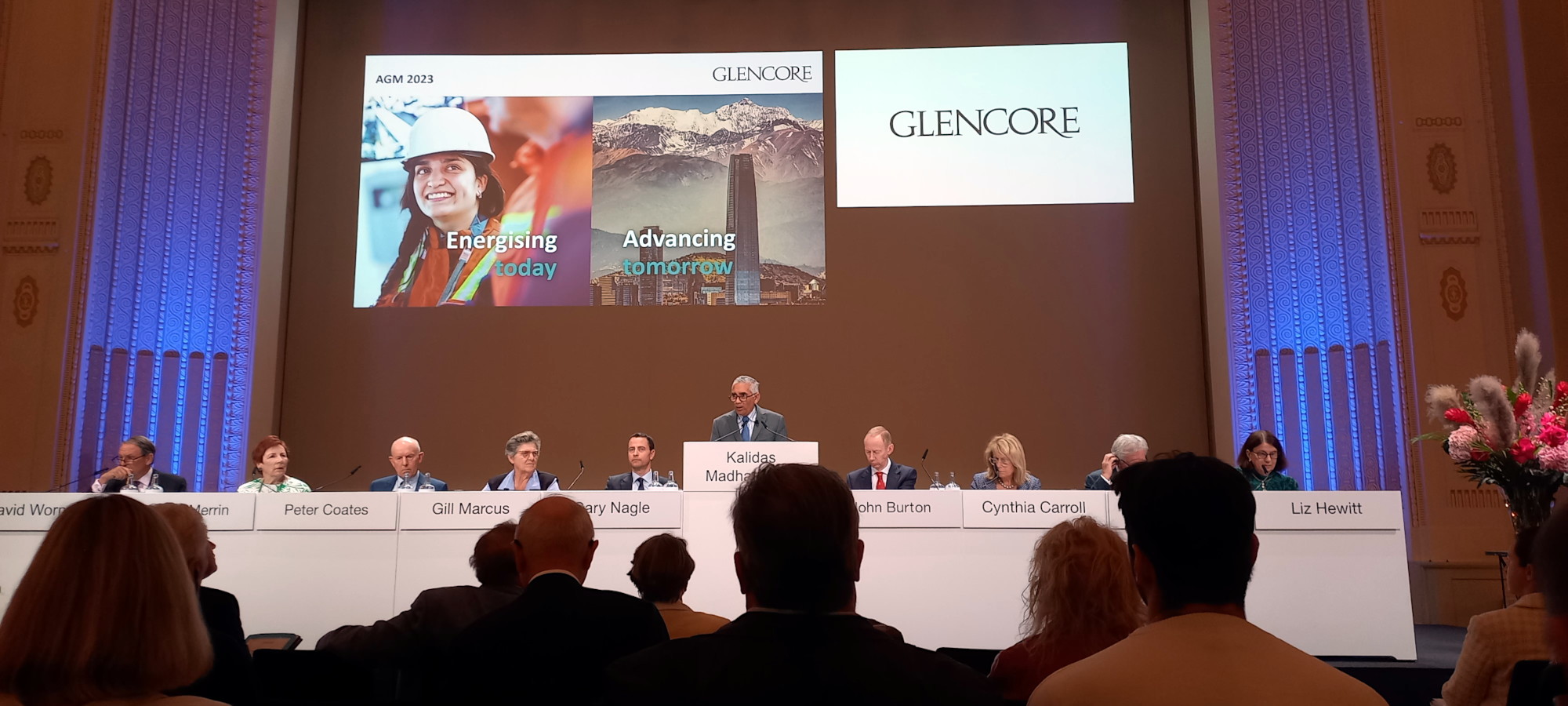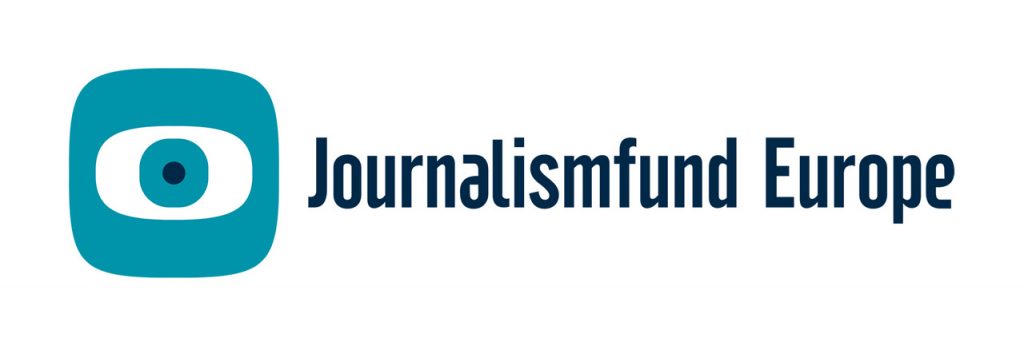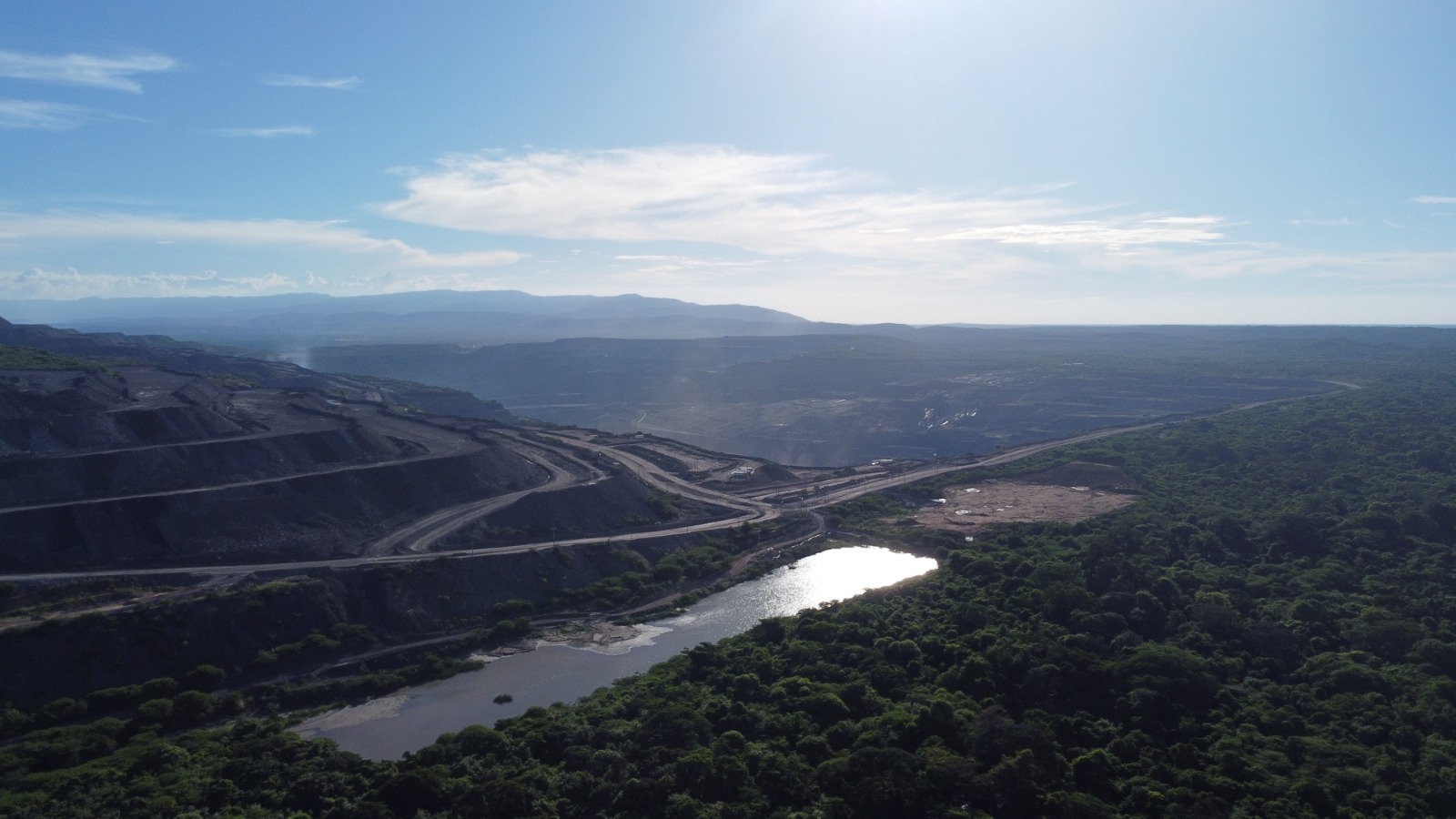By: Andrés Gómez – 01 August, 2023
Glencore’s top executives choose evasiveness when it comes to addressing questions about human rights, labor, and environmental violations. Their actions in Colombia, surrounded by controversy, appear to be just a reflection of a broader and concerning practice that extends wherever they have operations in the world.
Glencore is the world’s largest mining company. In fact, it has been at the top for a decade, thanks to the acquisition of Xstrata and various controversial financial maneuvers that have allowed it to become the dominant player in markets such as coal. In 2022, its profits (EBITDA) reported a surprising growth of 37.5% during the war in Ukraine and a global shortage of fossil fuels.
However, the achievements of the Swiss company are contrasted with a troubling pattern of malpractices and negligence, not only in Colombia, where it controls the largest coal operation in Latin America, but also in all the countries it operates in, such as Australia, Canada, Peru, Zambia, and the Democratic Republic of the Congo, among others.
Workers, environmental activists, indigenous peoples, and community leaders affected by Glencore’s activities gathered in the Swiss city of Zug on May 26th to demand answers to their complaints at the company’s shareholder meeting. In this forum, unionists from Australia, Canada, Colombia, and Peru, as well as representatives of impacted communities in the Colombian departments of Cesar and La Guajira, along with several shareholders who invited them, exposed the problems brought about by the company’s actions worldwide and questioned those making decisions. The response from Glencore’s board members was repetitive and perplexing: «We were not aware,» a phrase that non-executive chairman Kalidas Madhavpeddi repeated throughout the hour and a half meeting.
El Turbion accompanied the international delegates to this meeting with Glencore’s shareholders, investigated the company’s behavior in the world, and requested statements from its executives regarding these inquiries. All of this was part of our investigation titled ‘Exposing Glencore’s greenwashing.’ Despite the Swiss multinational not responding to our interview requests, the responses from the top officials of the world’s leading mining company during the assembly speak volumes about their attitude towards climate, labor, and social issues arising from their activities.
A meeting marked by allegations of malpractices
At the entrance of the Casino Theater in Zug, around 30 activists from around the world gathered, convened by the London Mining Network, Yukpa Solidarity Network and IndustriAll organizations, along with delegations from Australia, Canada, Colombia, and Peru. As Glencore’s shareholders entered the assembly, they chanted slogans against the company and its anti-union and polluting practices worldwide.
Unfortunately, some people were missing: 10 delegates from South Africa and the Democratic Republic of the Congo couldn’t attend because Swiss immigration authorities denied them entry to the country, despite having valid visas and other documents. Even though it was evident that these individuals were coming from these African countries to attend Glencore’s shareholder meeting, the only argument given to them was that they should arrive on the same day as the meeting and not before, leading to their exclusion from Switzerland, as reported by IndustriAll.
This profiling by Swiss authorities allowed Glencore to evade, among other things, the repeated accusations it faces regarding human rights violations in the Democratic Republic of the Congo. This situation prompted the Swiss Foundation for Sustainable Development (ETHOS) to exclude Glencore from its investment portfolio since 2011:
«The health of local populations is threatened by both environmental pollution from the mines and water and soil contamination from sulfur and lead emissions that exceed legal limits. Faced with these significant controversies, Glencore does not engage and provides very general responses.»
«This is the best financial year for the company in a long time»
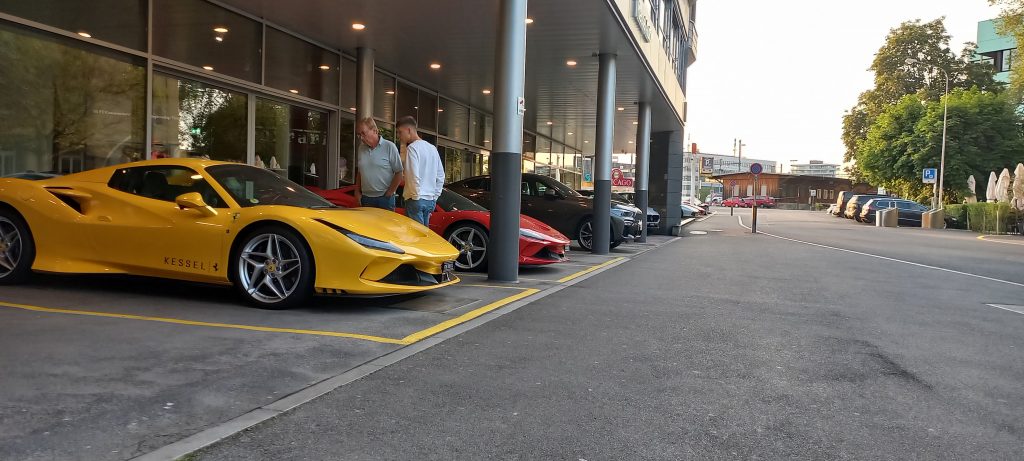
Zug is a small city in central Switzerland and serves as the capital of the canton with the same name. It is known for imposing the lowest taxes on large companies that establish themselves there, compared to other cantons in Switzerland, which is already considered a tax haven, ranking fifth in the «2021 Corporate Tax Haven Index» after the British Virgin Islands, the Cayman Islands, Bermuda, and the Netherlands.
Close to Zug, in the city of Baar, is where Glencore’s headquarters are located, and preparations were made for the company’s general shareholder meeting, the largest business gathering of the world’s leading mining company. Once the meeting started, Mr. Madhavpeddi spoke for just over 10 minutes. He first addressed the multinational mining company’s finances and assured its shareholders that 2022 was a significant year in terms of results, stating that «this is the best financial year for the company in a long time.»
As reported by the board of directors, in 2022, Glencore’s shares increased in price by over 30%, and the company earned USD 34.1 billion in profits (EBITDA), achieving an increase of over USD 12.8 billion in this regard compared to 2021. This success was significantly influenced by its coal business, a sector of the economy where Glencore is dominant, and its indicators have surged since the beginning of the war in Ukraine and the increased global demand for coal for electricity generation following the end of COVID-19 quarantines. According to the company, 68% of its profits from industrial activities come from energy sources, including coal, and 81% of its profits from international trade activities directly result from its coal-related businesses.
Currently, Glencore operates 14 coal complexes in Australia, 5 in South Africa, and 3 in Colombia. In the South American country, it maintains the active El Cerrejón mine in the La Guajira department, the largest in Latin America, and uses the facilities of the La Jagua and Calenturitas mines in Cesar to develop a coal marketing operation that purchases coal from other companies, which was not disclosed to its shareholders. Additionally, it manages one of the largest fleets of coal-carrying merchant ships in the world.
In 2022, global coal consumption reached its highest level in history: 8.3 billion tons were burned worldwide for electricity production, as recently reported by the International Energy Agency (IEA). Of this, 110 million tons were extracted from Glencore’s mines, according to their report to the shareholder assembly, and a significant amount was bought from other mining companies for its international coal trading business, which has been highly profitable due to market volatility during the last year. As of May 2023, Glencore achieved a market capitalization of USD 70.47 billion, making it the second-largest coal company in the world after China Shenhua Energy.
However, this lucrative business is bringing severe consequences for all inhabitants of the planet. According to the IEA, of all the fuels used in thermal power plants worldwide, with the exception of nuclear, coal is by far the largest producer of carbon dioxide emissions, accounting for 79% of the total greenhouse gas emissions in electricity production, above gas, oil, biomass, or others.
Before this reality and amidst the hottest months ever recorded on the planet, Madhavpeddi did not address Glencore’s responsibility in the serious problem of climate change. Instead, he presented what the company intends to do regarding a possible global transition to a low-carbon economy: «In the transition plan we published in 2020, our goals were reductions, as we all know, of 15% by 2026 and 50% by 2035.»
In this way, the board of directors rejected the demands of 24% of the investors, who presented a climate resolution specifically concerning Glencore’s thermal coal production. The same proposal was also denied last year when the Swiss company acquired full ownership of El Cerrejón in Colombia and opened new coal mines in Australia.
The executive also addressed worker deaths in their operations and reported «four fatalities,» stating that their goal is to prevent «all» of them:
«Across all our businesses and operations, we believe we are getting closer to our ambition of preventing all fatalities, occupational diseases, and injuries at work […] We have already spent USD 130 billion on improvement programs worldwide, and we expect to spend another USD 500 million in the next three years.»
He also spoke about the company’s million-dollar social investments that it claims to make «in the developing world»:
«I am proud to become a significant investing partner in the developing world. Where we operate, we commit to create value ethically and sustainably. We employ tens of thousands of people, support local businesses and service providers, and invest in education, healthcare, and local infrastructure. Around 2.5 million people living near our industrial assets benefit from our community investments in activities that include environmental indices, healthcare facilities, and their programs. Lastly, we have paid 12 billion dollars in taxes and royalties […] We welcome tax transparency.»
Evasive Responses
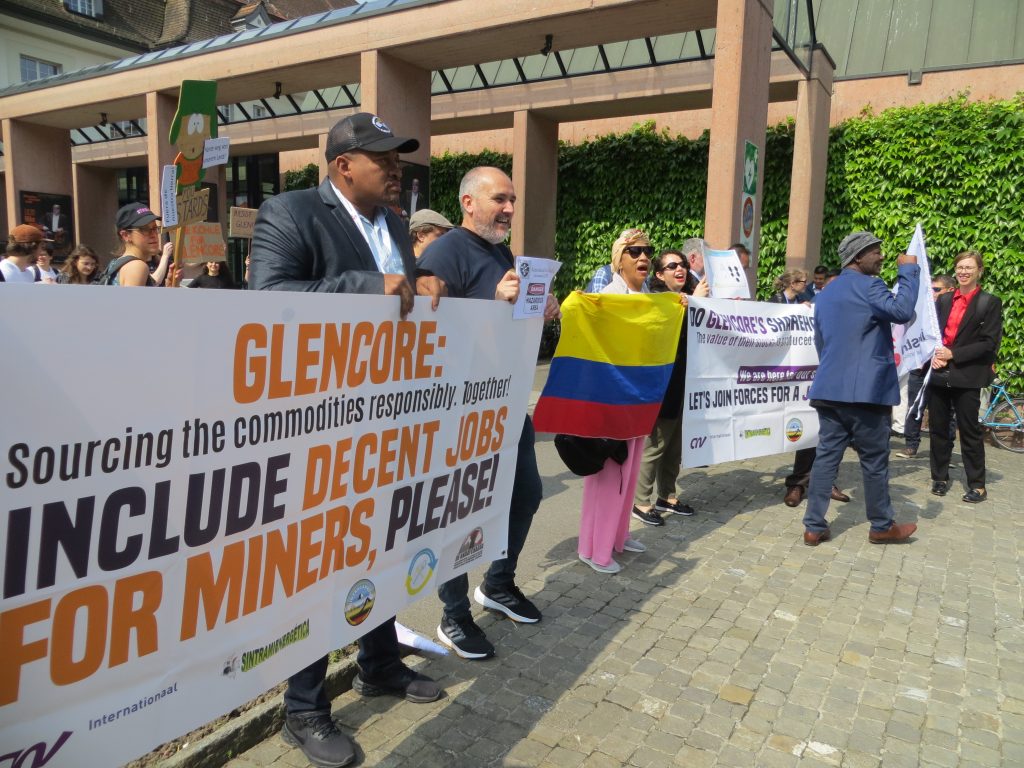
After Madhavpeddi’s presentation on what he considers to be Glencore’s good conduct in the past year, a shareholder requested the floor to inquire about the people shouting and holding banners in front of the building: «I felt uncomfortable seeing those people outside. Could you please explain what all of this is about? Why are people protesting against the company?»
Kalidas Madhavpeddi’s response set the tone for the remaining 80 minutes of the annual meeting:
«What are people doing outside? People outside can say whatever they want to say, but, as I mentioned in my opening remarks, Glencore is a company that focuses on helping the communities and countries where it operates, and we may not always agree with some people, but personally, I am not aware.»
Criticism of the company’s malpractices became a constant theme. Glencore is accused of failing to provide decent and safe working conditions for its employees, engaging in workplace harassment, and disrespecting fundamental rights of its workers, including freedom of association in unions and the right to collective bargaining, among others. In Colombia, the company has been accused of contaminating and displacing indigenous, peasant, and Afro-descendant communities in La Guajira and Cesar without offering fair compensation or proper relocation. It is also accused of significant air, water, and soil pollution, not only in Colombia but also in Canada. Due to non-compliance with environmental regulations, emissions from a smelter in the city of Rouyn-Noranda have forced the population to relocate.
Robin Williams, president of the Northern Mining and Energy District Trade Union in Australia, addressed Glencore’s responsibilities for the pollution caused in the McArthur River, leaving it contaminated for 1,000 years, affecting the ancestral Gudanji communities and the inhabitants of the Borroloola town. He questioned Glencore’s board of directors about how they planned to expand the mine and decontaminate it without a management plan. Glencore has promised that it will only guarantee the safety and stop monitoring the river waters near the mine site until the year 3037, as it will only be safe by then.
Regarding this issue, Madhavpeddi stated, «we respect indigenous rights,» and he asserted that Glencore acknowledges that some of its industries are located on traditional territories, so they conduct consultations with indigenous peoples: «we commit to negotiate in good faith to reach agreements that protect the interests and legitimate ownership of indigenous lands,» he assured.
Glencore was also accused of having anti-union policies in Australia. Before the assembly, Mr. Williams stated that Glencore outsources key aspects of its operations to reduce labor costs, harming its workers:
«What they do is pay a contracting company and then use those employees of the contracting company on their premises, paying them between USD 30,000 and 50,000 less per year than permanent or current Glencore employees. This reduces our capacity for collective bargaining and undermines our collective bargaining system in the country. It also allows the employer, Glencore, to do some quite harsh things with those contractors, as they fear losing their jobs as casual employees who can be dismissed at any time. This creates a culture where they do not report injuries […] do not report accidents with machinery, do not report intimidation or harassment, do not report sexual harassment.»
Alex Tinoco Román, General Secretary of the Andaixaba Miners’ Metallurgical Workers Union in Peru, also addressed Glencore, exposing the labor harassment by the company Volcan, in which Glencore holds a 23% majority stake. Mr. Tinoco clarified that he has been fired twice for exercising his rights as a unionized worker, and although he has been reinstated by a judge, he fears a third dismissal for speaking at Glencore’s general assembly and exposing the company’s abuses against him and the workers he represents. He affirmed that Volcan outsources essential operations, pays very low wages to subcontracted workers, forces people to be exposed to extreme heat, and implemented a work system that deprives them of the additional pay for working on Sundays, as provided by Peruvian laws:
«We work in a 14 on, 7 off system, meaning we work 14 days and have seven days off. It is an accumulative system that cuts several benefits for us, such as Sundays, which should be paid 100%, and holidays, but now they treat them like any other day.»
The board did not listen to him, and at the end of the meeting, he told El Turbion:
«I felt frustrated because they could have at least listened and said, ‘let me investigate,’ but they make us look like liars […] We know that in the mine, we are killing ourselves every day due to constant exposure to [carbon] monoxide, dust, lack of oxygen, noise […] They do not value the human personnel working inside the mine, a thousand meters underground.»
Dominic Lemieux, advisor to the Mining Sector at IndustriAll and director of District 5 for United Workers in Canada, reported that Glencore does not even comply with judicial decisions in its country regarding workers’ rights:
«Less than a year ago, we received a government court decision indicating that Glencore attempted to evade the union and eliminate job positions of people due to their union affiliation. For us, this is unacceptable. If they can do that in Canada, with strong unions and solid labor laws, how could they act in other places around the world? It seems they are the same everywhere, even in Canada or Colombia, where we have brothers and sisters. They do not respect the local communities worldwide.»
Mining Contamination
An hour into the assembly and in response to Glencore executives’ evasive answers, indigenous leader Esneda Saavedra questioned the impacts of Glencore’s mining on the past, present, and future of the Yukpa people, who have historically inhabited the Perijá mountain range in the Colombian department of Cesar:
«I am a Yukpa woman from an indigenous reserve that Glencore reached and I have witnessed the transformation and environmental contamination that causes the death of children: more than 40 children have died in our territory [this year], and this happens because of the open-pit mining’s contamination. It has caused the death of children and environmental harm to the people of Becerril and La Jagua de Ibirico.»
Madhavpeddi’s response was a brief statement: «From our perspective, we are doing everything possible in terms of operation at our facilities. I am not aware.»
The statement from the Yukpa indigenous representative did not sit well among Glencore’s board members. They were visibly upset by the numerous interventions accusing them of labor malpractices, environmental impacts, and even causing the deaths of indigenous children.
To try to defuse the situation, Madhavpeddi asked the shareholders if they had any business-related questions. The response he received was that all questions had been related to business.
Incompetence or Company Policy?
What is striking about Madhavpeddi’s responses on behalf of Glencore’s board of directors is his insistence that he was not aware of the anti-union and environmental destruction practices that the Swiss company is accused of. If this were the case, it would indicate at least incompetence on the part of those making decisions in the world’s largest mining company, although it seems not to be the case.
For example, someone well-acquainted with two of the countries where the complaints originated is Gary Nagle, who is now the CEO of Glencore and had extensive work experience in Colombia and Australia. Mr. Nagle was present throughout Glencore’s general assembly but did not respond to the questions or accusations. According to Glencore’s website, Nagle joined the company in 2000 as part of the coal business development team and was also a manager of its subsidiaries in both countries:
«Mr. Nagle worked for five years (2008-2013) in Colombia as CEO of Prodeco. He then moved to South Africa to be in charge of Glencore’s Ferroalloys assets (2013-2018). Later, he was in charge of Glencore’s coal assets based in Australia. He also served on the board of directors of Lonmin PLC from 2013 to 2015 and has represented Glencore on the mineral councils of Australia and Colombia.»
It is not surprising that Mr. Nagle did not respond and distanced himself from the issue, especially since during his tenure as CEO of Prodeco, Glencore’s first subsidiary in Colombia, the company responded to one of the largest strikes it faced in the South American country by militarizing La Jagua de Ibirico mine at the end of 2012. Shortly after, several union leaders faced assassination attempts and threats, while others were fired.
Successes and Accusations
While it has been the best financial year in a long time for Glencore, its 2023 annual shareholders’ meeting was marked by the fact that the powerful multinational could not hold the meeting as it wanted and, instead, had to face accusations against it all the time, which made it impossible to hide the consequences of its actions from investors and shareholders. The short duration of the meeting and the maneuvers of the executives to end it quickly are clear evidence of this: the most important business gathering of the year for the company lasted only 90 minutes, and little could be celebrated about the positive impact of the war and speculation with coal on its businesses.
Undoubtedly, there is a concerning willingness for things to change among Glencore’s board of directors. Their attitude towards accusations from around the world was to excuse themselves by claiming, at the very least, an implausible lack of knowledge of the conflicts that their operations have caused. However, it is crucial that both its executives and shareholders take responsibility for the damages caused. This is especially important for major capital investors, such as pension funds from wealthy countries like Sweden and Denmark, who should demand changes in the company’s behavior.
So far, solidarity has brought complaints about the consequences of their malpractices to their doorsteps. However, more actions are needed for this mining giant to be held accountable for the impact it has had on communities, workers, and the planet’s health.
This work is part of the series «Exposing Glencore’s ‘Greenwashing’,» an investigation developed by El Turbión in Colombia, Danwatch in Denmark, and MediaContinente in Sweden on the environmental, labor, and human rights impacts of Glencore’s coal mining operations.
This investigation has been developed with the support of Journalismfund Europe.
Also, it received support from International Media Support for the initial stage of the investigation.
Si encuentras un error, selecciónalo y presiona Shift + Enter o Haz clic aquí. para informarnos.

